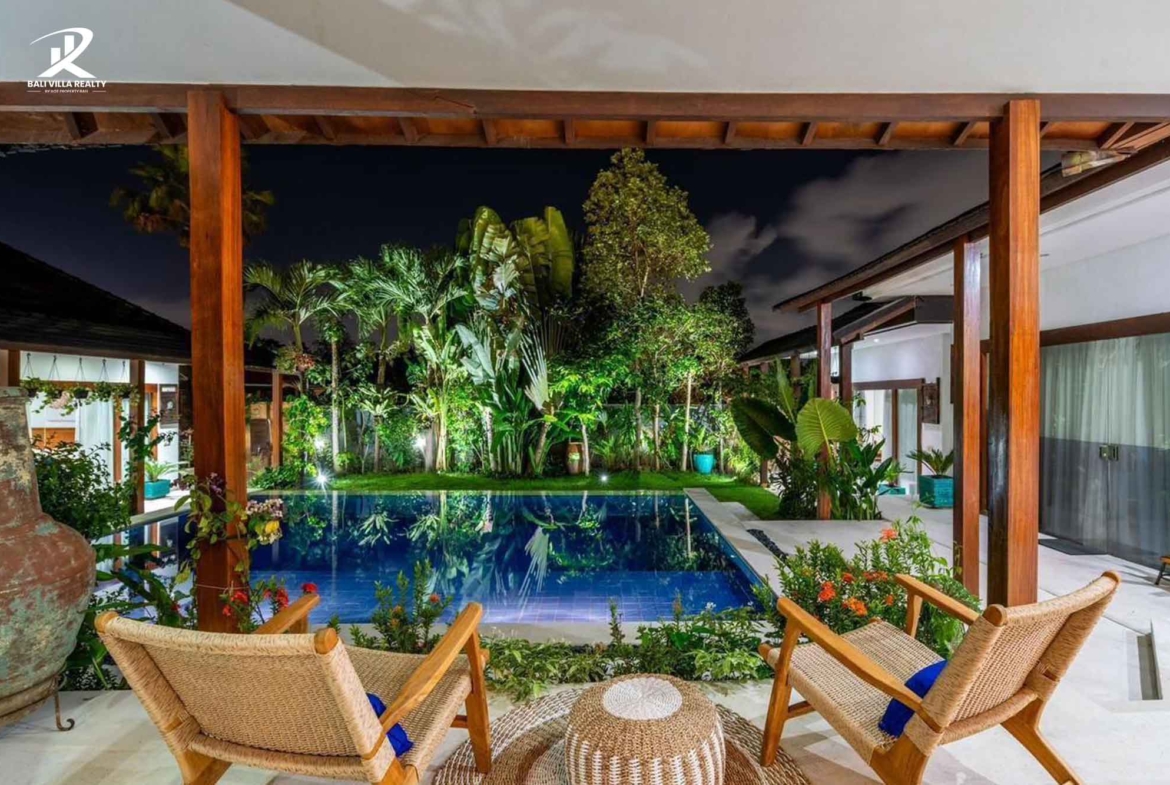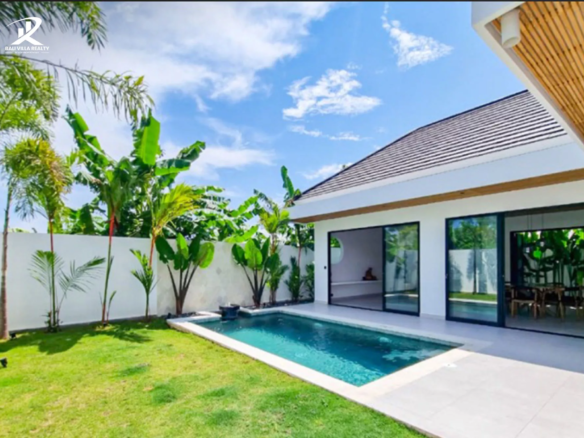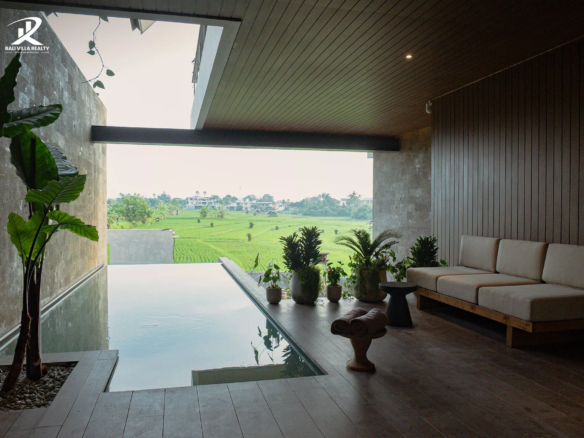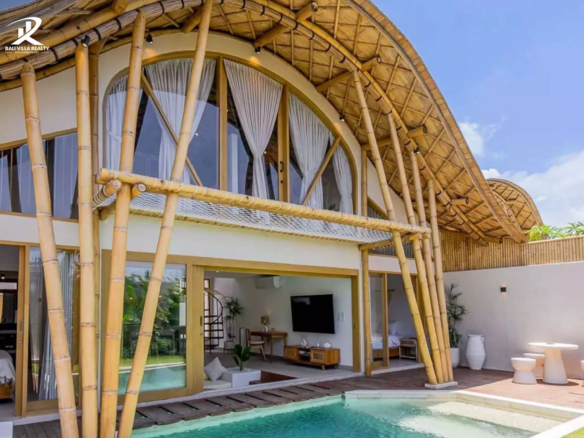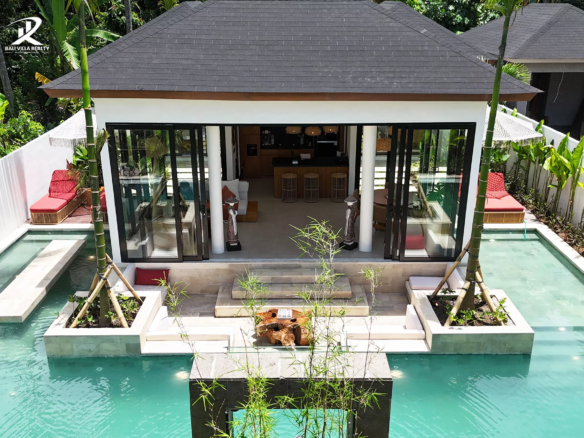Bali has strong rental market potential. In April 2025 alone, tourism increased by around 25.56%, and the occupancy rate reached approximately 57.23% (read our full report here). And great news—foreigners can rent out their villas for short- or long-term and earn profit.
It’s a great way to generate income, especially if you’re not using your villa all the time. However, it does come with some challenges. You’ll need to consider permits, property management, tenants, taxes, and more.
With the right plan, though, you can manage your rental business smoothly—and this guide is here to help you do just that. Keep reading!
Key Takeaways
- Foreigners can legally rent out villas in Bali through proper structures like leasehold or PT PMA and with the right permits (e.g., Pondok Wisata license).
- Rental options—daily, monthly, and yearly—have different returns and legal requirements, with daily rentals offering the highest yields (8–14%) but requiring more management.
- Short-term rentals bring higher profit potential, while long-term rentals offer stability and easier management.

1. Understanding the Legal Side
First things first, you need to understand the legal side. Foreigners can own property through two methods:
- Leasehold: You rent the land for a fixed period (usually 25–30 years). You own the building during that time, but the land ownership returns to the original owner when the lease ends.
- Freehold: You own both the land and the building permanently (through PT PMA structure) It gives full ownership rights but is only available to Indonesian citizens.
Besides that, you also need to ensure your property meets other legal requirements properly:
- Check the Land Zoning: Your property must be in a commercial or tourism zone. If it’s in a green zone, you could face serious issue like what's currently happening at Bingin Beach.
- Get the Right Permit: Get a Pondok Wisata license (homestay permit) if you want to rent your property short-term, like on Airbnb. You can apply if your villa is in the right zone and follows building rules.
Read More: Freehold vs Leasehold: Which Ownership Type is Right for You?
2. Decide How You Want to Rent It Out
There are different ways to rent your property in Bali:
- Short-Term Rentals: These are popular with tourists and offer higher income potential, especially during high season.
- Long-Term Rentals: Great for a more steady income, often preferred by expats looking to live in Bali for a few months to a year.
Each has its pros and cons. For example, short-term rentals can earn more in peak season, but long-term rentals mean less turnover and fewer management hassles. It’s also a good idea to learn more about your target customer so you can plan more effectively.
3. List Your Property Online
Choose platforms that work best for your rental goals:
- Airbnb and Booking.com: Perfect for short-term stays, especially for tourists looking for vacation rentals.
- Long-Term Rental Sites: For long-term rentals, many people use real estate agency like Bali Villa Realty or join Facebook groups.
Remember to create a catchy title, clear description, and set a competitive price. Don’t be afraid to check other similar listings to see what they’re offering (just to keep yours competitive).
Read More: Ultimate Guide: How to Start an Airbnb Business in Bali
4. Manage Bookings and Guest Expectations
Whether you’re nearby or not, managing bookings and guests can be a big task. If you live in Bali and have time, you can handle the property on your own.
However, many owners prefer to hire property managers. They can handle everything for you, from talking to guests, cleaning, maintenance, and sometimes marketing. It's the easiest way to keep things running, whether you're in Bali or not.
5. Pay Attention to Taxes and Reporting
Rental income in Bali is taxable. To stay compliant, you have to understand how it works:
| Tax Name | Description | Types / Conditions | Due Date |
|---|---|---|---|
| Income Tax (PPh) | Tax on income earned from renting out your villa in Bali. The rate depends on your residency status and legal business structure | - Non-resident individuals: 20% final tax on gross rental income - Resident individuals: Progressive tax from 5% to 35% on net income - PT PMA: 25% corporate income tax on net income | The 10th of every month |
| Value Added Tax (VAT / PPN) | Applies if your villa rental includes hotel-like services (daily housekeeping, breakfast, etc.) | - VAT Rate: 11% (as of 2025) - VAT Registration: Required if annual revenue exceeds IDR 4.8 billion | the 15th of every month |
In most cases, your tenant or property manager will withhold the tax and send it to the tax office for you. So you can sit back and relax.
6. Promote Your Property Online
List your villa on booking sites is a good start. But, to boost bookings and get a higher rental income, you may need to do a bit of marketing. Here's how:
- Create a Social Media Page: Show off your villa with photos and promos to attract more interest.
- Encourage Guest Reviews: Positive reviews help your villa stand out and appeal to future guests.
- Run Special Offers: Discounts for early bookings or long stays can help fill your calendar, especially during the low season.

Read More: Can You Make Money in Bali Without a Work Permit?
Daily, Monthly, or Yearly Rentals: What’s Best for You?
You can rent out your villa daily, monthly, or yearly—it’s completely up to you. However, many of our clients often ask about the ideal rental duration to achieve the best return.
Here’s a quick comparison to help you understand the differences:
| Rental Duration | Best For | Legal Requirements | Pros | Cons |
|---|---|---|---|---|
| Daily Rentals | Tourists, short-term guests, Airbnb-style stays | - Pondok Wisata license - Your villa must be located in the pink zone | - High income potential (8–14% annual yield) - High occupancy (up to 90% in hotspots like Canggu) - Great for maximizing short-term ROI | - Needs full villa management (daily): cleaning, bookings, guest support |
| Monthly Rentals | Digital nomads, expats, long-stay travelers | - PBG/SLF (Building Permit) - Rental agreement - Tax obligation (10%-20% of your earnings) | - Steady income - Less effort than daily rentals - Growing demand in hotspots like Canggu and Umalas | - Risk of careless tenants - Harder to replace tenants (if problems arise during the rental period) |
| Yearly Rentals | Hands-off owners, passive investors | - A valid IMB/PBG (Building permit) - Rental agreement - Tax obligation | - Low effort (no frequent turnover) - No need for daily or monthly management | - Lower overall income - Long commitment with one tenant |
Read More: Can You Resell Your Bali Property? Guide to a Profitable Resale
Conclusion: Simplify Your Bali Villa Rental Process
So, that’s how you can legally rent out your villa in Bali as a foreigner. With the right permits and marketing plan, you can rent your property for both short- and long-term stays.
Feeling overwhelmed with all the tasks to handle? Don’t worry—many foreign investors feel the same. And that’s where we come in.
At Bali Villa Realty, we help foreign investors navigate Bali’s rental market with ease and confidence. From finding the right property to ensuring full compliance, our team is here to make your investment journey smooth and profitable.
Schedule a free consultation with one of our senior advisors today and let us help you manage everything from start to finish.
Want to start investing in Bali property?
Have a quick chat with our real estate experts for personalized advice on your Bali investments. No commitment required.
FAQ
Villa rental prices in Bali vary. Short-term stays cost $100–$500+ per night, while long-term rentals range from $1,000 to over $5,000 per month, depending on location, size, amenities, and season.
Returns on villa rentals are often strong, typically between 7% and 18% annually. Some top-performing properties can even reach 20%.
Foreigners can get a mortgage in Bali, though it comes with unique conditions. Local banks offer options mainly for those living in Indonesia, and they usually require a large down payment (at least 40%).

